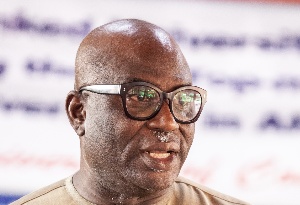- Home - News
- Elections 2024
- News Archive
- Crime & Punishment
- Politics
- Regional
- Editorial
- Health
- Ghanaians Abroad
- Tabloid
- Africa
- Religion
- Photo Archives
- Press Release
General News of Wednesday, 9 April 2025
Source: www.ghanawebbers.com
'We prefer repatriating them' – Deputy Interior Minister justifies deportation of foreign galamsey suspects
Deputy Interior Minister Ebenezer Terlarbi has defended the government's decision to deport foreign nationals involved in illegal mining, known as galamsey. He believes deportation is more practical than prosecution.
Terlarbi spoke on PM Express on April 8. He acknowledged that the policy faces criticism but emphasized its necessity. He cited issues like court backlogs, overcrowded prisons, and logistical challenges with mass arrests.
He explained that litigation in Ghana can be frustrating. Many arrested individuals demand trials and hire lawyers, which delays justice. “We prefer repatriating them rather than taking them through our courts,” he said.
The Deputy Minister stressed that deportation is not about letting offenders go free. It aims to prevent a breakdown of the system. He mentioned difficulties in verifying identities of some arrested individuals.
“Some don’t have passports, making it hard to establish their identities,” he noted. Once they enter the system, tracking them becomes challenging.
Terlarbi also expressed concerns about prison capacity. Currently, there are 1,400 inmates, and feeding them is problematic. “If we can avoid worsening this situation by sending them home, I would choose that,” he stated.
When asked about double standards for Ghanaians versus foreigners, Terlarbi disagreed. He pointed out logistical issues when arresting many foreign nationals at once.
“You arrest about 80 Chinese; finding space for them is tough,” he explained. Transporting them to court can also be a challenge.
While acknowledging similar issues for Ghanaian suspects, Terlarbi hinted at undisclosed factors affecting the situation. “There’s much going on behind the scenes,” he said.
Earlier this week, the Interior Minister announced changes in police leadership in mining areas. All regional and district commanders who have not achieved results will be replaced.
The repatriation aspect of this policy continues to spark public debate. Critics argue it creates an unfair justice system and undermines efforts against environmental crimes.
Despite this criticism, Terlarbi insists the government is doing its best under challenging circumstances.











